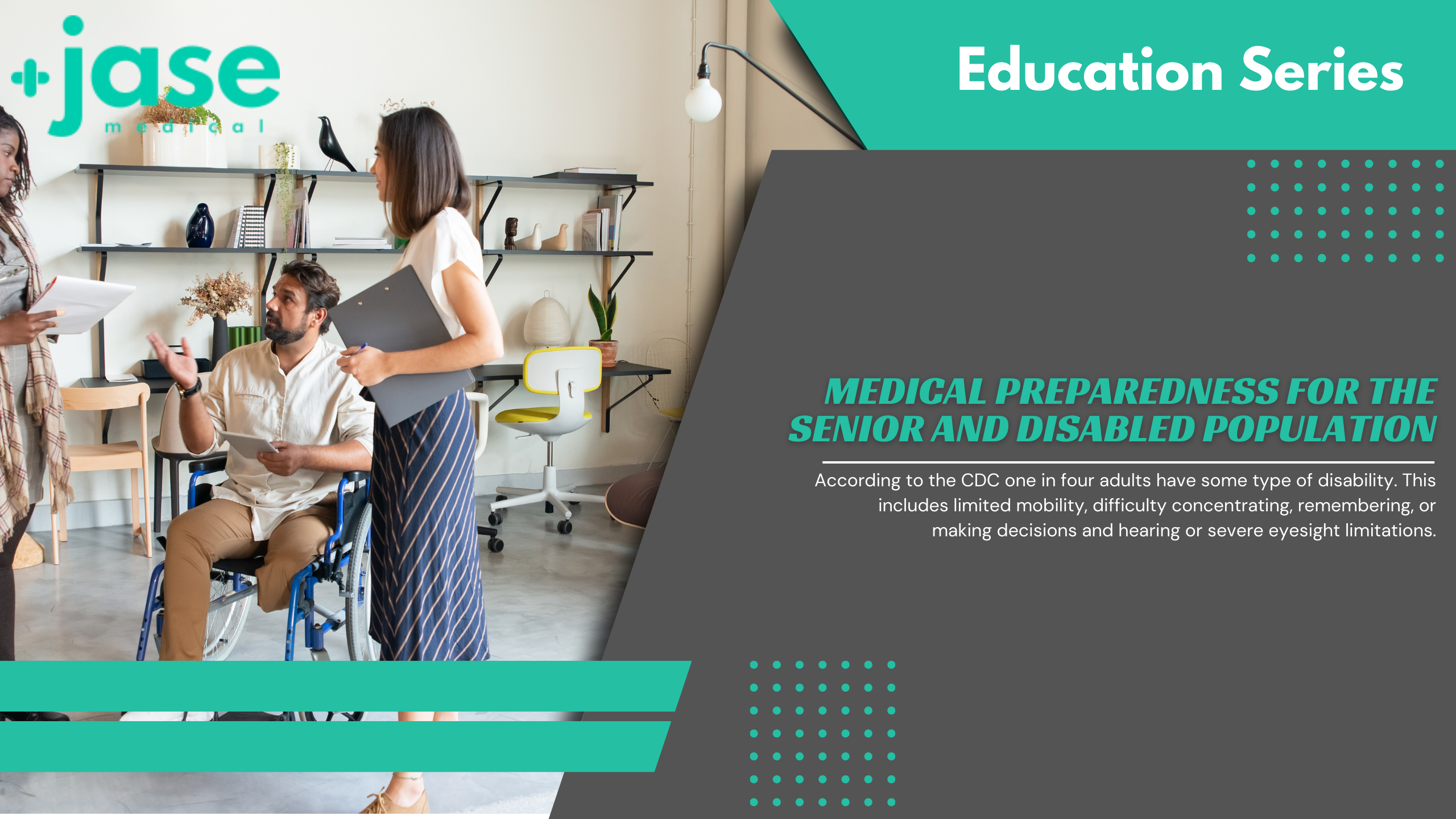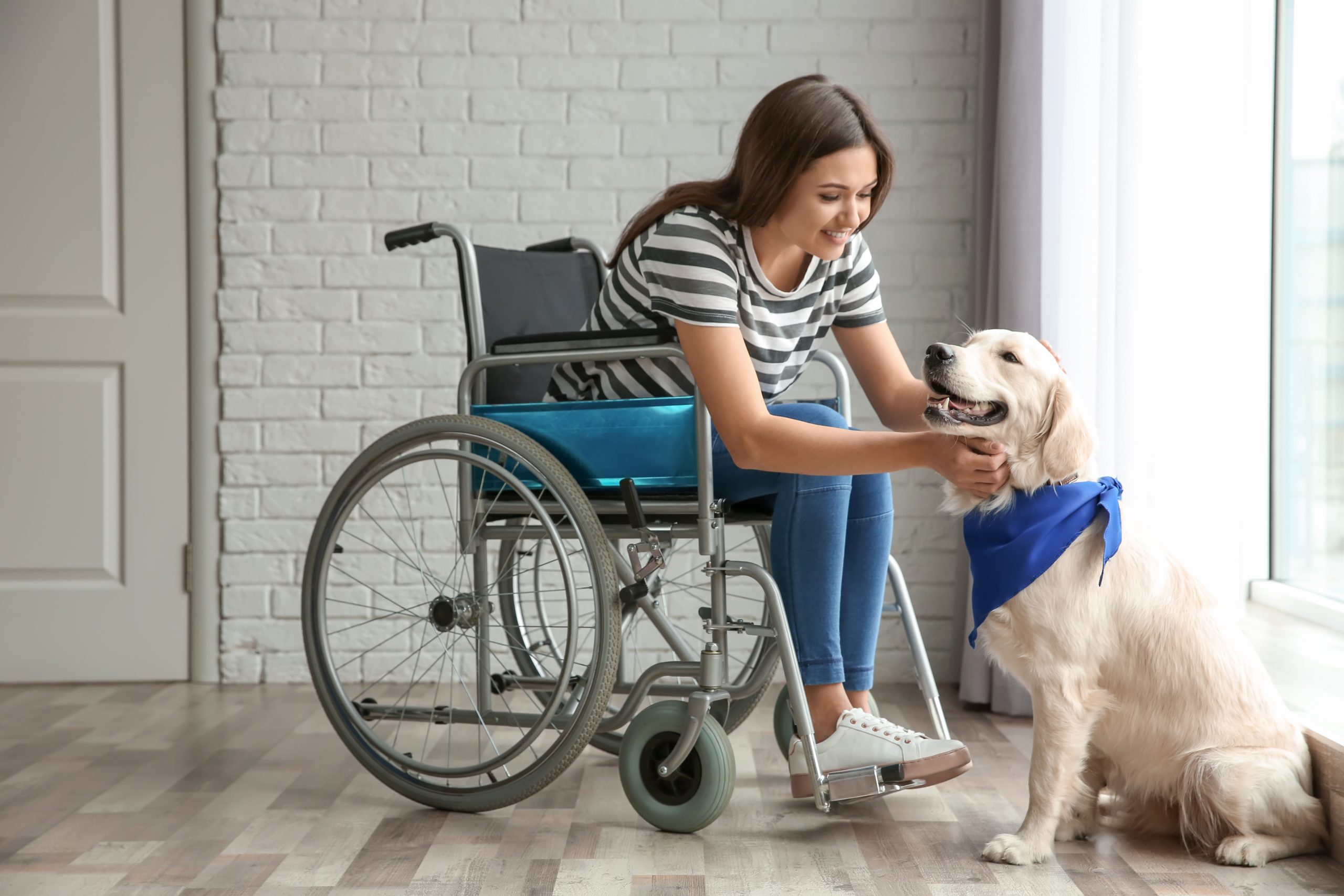If you’re considering Jase, chances are you’ve paused and thought, “This makes sense, but I still have a few questions.”You’re not alone. Here are the most common ones we hear, answered plainly. Is this really doctor-prescribed? Yes. Every Jase order is reviewed by a...
Medical Preparedness for the Senior and Disabled Population

According to the CDC one in four adults have some type of disability. This includes limited mobility, difficulty concentrating, remembering, or making decisions and hearing or severe eyesight limitations. In addition, the Census Bureau reports that 36% (about 18.2 million people) of seniors, age 65 and older have one or more disabilities.
These numbers represent a large section of our population. How many have a medical emergency plan in place, especially if there is no medical care available for the immediate future?

Putting together a medical preparedness plan
Depending on the disability, being medically prepared will be highly individualized and tailored to the person’s needs and abilities. A few things to consider are:
Mobility issues– Mobility issues can make it difficult or impossible to access or provide medical care. Limited mobility includes stroke, arthritis, multiple sclerosis, amputations, post-surgery, and vertigo patients. This also includes persons who are bedbound, or use a wheelchair, cane, or walker.
Cognitive/dementia/autism disabilities– Unable to understand or remember directions, such as when to take meds, remembering their name, address, etc. can lead to further injury and declining health.
Hearing and sight limitations– Patients who are unable to see or hear directions (or both) won’t be able to follow through with emergency plans unless adaptive solutions are in place.
NON-EMERGENT MEDICAL PREPAREDNESS WHEN THERE IS NO MEDICAL CARE AVAILABLE
Medical preparedness for seniors and disabled is much like preparedness in the general population with a few differences. Mobility, cognition, and sensory deficits add an additional layer of complexity. Having systems and supplies in place will enable you and your loved ones to handle non-emergent medical issues.
- Mobility impaired-If using a wheelchair or mobility device, make sure it receives regular maintenance. Canes usually have tips that need replaced periodically. Have an extra tip on hand. If in a hospital bed, be sure that the bed allows for manual operation in case the electricity goes out.
- Blind or hearing impaired– There are battery operated medicine dispensers that can dispense the correct meds at the right time. Flashing and audio signals are available to alert when drugs are dispensed. Keep extra batteries for back up.
- Cognitive decline/ dementia/autism– Routines are very important. Having favorite foods, clothing and schedules will be necessary during a medical grid down scenario.
Suggested list of supplies
The following is not an exhaustive list of supplies. Each situation will be different according to the type of disability and age. Use this as a guide and start your own checklist. Review monthly.
- Extra portable oxygen tanks with cannulas/masks
- At least 3 (6 or more is better) month’s supply of meds and supplements
- Jase case
- Bottled water
- Extra bandages, tape, gauze, etc. especially if prone to injury or falls
- If wheelchair bound, make sure to have extra moleskin, pads, pressure relieving supplies and booties.
- If incontinent, have several bags of disposable underwear/briefs/pads on hand and a way to dispose of them. Include wipes also.
- Dry shampoo- this product will conserve water and is easy to use if the patient is bedbound.
- A personal GPS device (watch, pendant or phone) or alert monitor with 2-way communication. Check batteries monthly. Make sure the patient knows how to use it.
- Extra eyeglasses and case
- Extra batteries for hearing aid, and any extra necessary supplies.
- Make sure areas are well lit and paths clear during the night with nightlights to avoid falls.
- Consider utilizing a free app, such as the Caring Village app to coordinate care between family and care providers.
EMERGENCY EVACUATION OF HOME
If you are the caregiver for a disabled person have the following in place (depending on the disability):
- Contact Information: Have an envelope ready with diagnoses, meds, allergies, phone number of primary care provider, special directions regarding disability (limited mobility, hard of hearing or blind, etc.) family or other contact information. Even if medical help is not readily available, this information will help anyone providing care.
- Documents: Have medical records, living will, etc. included in the envelope with contact information.
- Grab bag of meds in easy reach- Keep this bag up to date and rotate medications and supplements. Include the Jase case in the bag. If on oxygen, have a portable oxygen tank with tubing and cannula within easy reach. Place contact information in the bag.
- Emergency Route to exit home: Have a preplanned exit route established and rehearse the route on a periodic basis. Make sure everyone knows where to meet- under a tree, neighbor’s yard, etc. Notify EMS personnel in advance of people in home with disabilities.
- Ways to leave the building-This will depend on the type of disability. If wheelchair bound or not mobile, keep paths that lead to outside clear. This will enable exit by wheelchair or pulled to safety using a chair with no wheels. If blind or hearing impaired most people can be led outside to safety.
When evacuating a cognitively impaired person it will be necessary to remain as calm as possible, and gently guide them outside while reassuring them.
- Brooke Lounsbury, RN
Medical Content Writer
Lifesaving Medications
Recent Posts
Keeping you informed and safe.
FAQ: Our most commonly asked questions about Jase
Medical Readiness: What Really Kills First
When Disaster Strikes, It’s Not Hunger or Thirst That Takes the First Lives In every disaster zone, from hurricanes in the Caribbean to war zones in Ukraine, the pattern is the same. People worry about food and water, but it’s infection that kills first. A small wound...
Exploring Dr. William Makis’ Hybrid Orthomolecular Cancer Protocol: Focus on Ivermectin and Mebendazole/Fenbendazole
Exploring Dr. William Makis’ Hybrid Orthomolecular Cancer Protocol: Focus on Ivermectin and Mebendazole/Fenbendazole *Disclaimer: This article is for educational purposes and does not constitute medical advice. Always seek professional guidance.* In the evolving...



